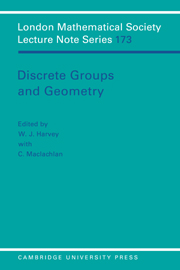Book contents
- Frontmatter
- Contents
- Preface
- Symmetries of modular surfaces
- Lifting group actions to covering spaces
- A combinatorial approach to the symmetries of M and M–l Riemann surfaces
- Inequalities for Pell equations and Fuchsian groups
- The Euler characteristic of graph products and of Coxeter groups
- Infinite families of automorphism groups of Riemann surfaces
- Planar hyperelliptic Klein surfaces and fundamental regions of NEC groups
- An example of an infinite group
- Moduli of Riemann surfaces with symmetry
- Modular groups – geometry and physics
- On automorphisms of free products
- The growth series of the Gieseking group
- Exceptional representations of PSL2(q) of monodromy genus zero
- On the rank of NEC groups
- The geometry of bending quasi-Fuchsian groups
- Farey series and sums of continued fractions
- Commensurability classes of two-generator Fuchsian groups
- Limit points via Schottky pairings
- Diagonalizing Eisenstein series III
- Some remarks on 2-generator hyperbolic 3-manifolds
- Uniformization, graded Riemann surfaces and supersymmetry
- Generating sets for finite groups
- Group actions on trees with and without fixed points
Exceptional representations of PSL2(q) of monodromy genus zero
Published online by Cambridge University Press: 10 December 2009
- Frontmatter
- Contents
- Preface
- Symmetries of modular surfaces
- Lifting group actions to covering spaces
- A combinatorial approach to the symmetries of M and M–l Riemann surfaces
- Inequalities for Pell equations and Fuchsian groups
- The Euler characteristic of graph products and of Coxeter groups
- Infinite families of automorphism groups of Riemann surfaces
- Planar hyperelliptic Klein surfaces and fundamental regions of NEC groups
- An example of an infinite group
- Moduli of Riemann surfaces with symmetry
- Modular groups – geometry and physics
- On automorphisms of free products
- The growth series of the Gieseking group
- Exceptional representations of PSL2(q) of monodromy genus zero
- On the rank of NEC groups
- The geometry of bending quasi-Fuchsian groups
- Farey series and sums of continued fractions
- Commensurability classes of two-generator Fuchsian groups
- Limit points via Schottky pairings
- Diagonalizing Eisenstein series III
- Some remarks on 2-generator hyperbolic 3-manifolds
- Uniformization, graded Riemann surfaces and supersymmetry
- Generating sets for finite groups
- Group actions on trees with and without fixed points
Summary
Abstract. We determine the values of q for which PSL2(q), acting on the cosets of a subgroup isomorphic to A4, S4 or A5, has monodromy genus 0.
Introduction
The monodromy genus γ(G; Ω) of a finite transitive permutation group (G, Ω) is the least genus of any branched covering S of the Riemann sphere with monodromy group (G, Ω); the monodromy genus γ(G) of a finite group G is the minimum of γ(G; Ω) as Ω ranges over all faithful transitive representations of G, that is, the least genus of any S with monodromy group isomorphic to G.
It is well-known [7] that cyclic, dihedral, alternating and symmetric groups all have genus 0. On the other hand, Guralnick and Thompson [3] have conjectured that at most finitely many simple groups of Lie type can be composition factors of monodromy groups of any given genus; Liebeck and Saxl [8] have verified this for simple groups of bounded Lie rank, but the general problem remains open.
In [5] I determined those q for which the natural representation of G = PSL2(q) on the projective line Ω = PG1(q) has genus 0 (all the prime-powers q ≤ 43 except 23, 27, 31 and 32). It is hoped eventually to determine all q for which PSL2(q) has genus 0 (in any representation), and to do this it is sufficient to consider the primitive representations, those for which the stabilisers H = Gα(α ∈ Ω) are maximal subgroups.
- Type
- Chapter
- Information
- Discrete Groups and Geometry , pp. 125 - 136Publisher: Cambridge University PressPrint publication year: 1992



